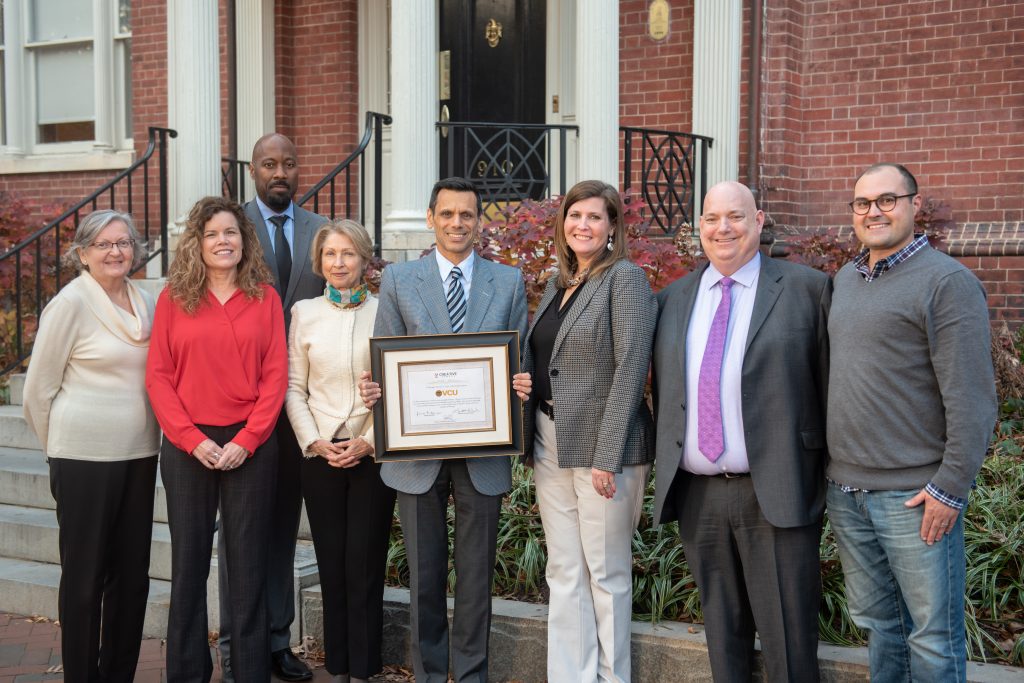VCU Earns Designation as Adobe Creative Campus


December 5, 2019
This month, Virginia Commonwealth University joins the ranks of innovative, forward-thinking institutions such as Indiana, Clemson and Temple universities as an Adobe Creative Campus. The designation from the multimedia, creative-software company recognizes colleges for incorporating problem solving into their curricula and fostering 21st-century methods of teaching and learning.
VCU is the first school in Virginia to earn this designation.
“I’m pleased with VCU’s designation as an Adobe Creative Campus,” said VCU President Michael Rao, Ph.D. “VCUarts faculty and staff’s work to foster creativity and digital literacy is critical in today’s world. They are the reason why VCUarts is recognized as the top public arts school in the nation and why our students excel in the classroom and beyond.”
While the School of the Arts has been instrumental in working with Adobe, the entire university is benefiting from the arrangement, which includes a 75% discount on Adobe Creative Suite for students from all disciplines. The Adobe Creative Campus designation also comes with a $50,000 gift, which will be used for student scholarships, said Andrew Ilnicki, director of strategic technology at VCUarts.

“[The university’s] commitment to support our students toward creative innovation and digital literacy was a standout [to Adobe],” he said. “Our values of equity, diversity and inclusion were also of note. Per Quest 2025, digital fluency using real tools that are highly in demand is at the heart of this partnership. Naturally, increasing the equity of access to these tools was key to that.”
Katie Gilstrap, assistant professor of marketing in the School of Business, has seen the demand for digital fluency firsthand from guest speakers she has invited to her class.
“What I was finding more and more is that the hiring community really has an expectation that our students — our marketing students in particular — have some fluency in Adobe,” she said. “And I think it’s [because of] the wonderful reputation that our School of the Arts has. A lot of hiring managers were at least hopeful, to say the very least, that our students had some fluency in the Adobe Creative Suite.”
Gilstrap convinced the School of Business to fund Adobe licenses for a pilot class this semester that provided skill-building opportunities for her students.
One class project tasked the students with creating a data collection instrument for VCU Health. Another had students working with Target to develop a strategy around kids gifting.
“They were expected to conduct research as a component of the class,” Gilstrap said. “And this really spoke to the data visualization component of creating research-based presentations. [Students] were expected to use Adobe in the development of their presentation materials.”
Gilstrap equates the Adobe products with Microsoft Excel, the Swiss Army knife of software.
“It’s a tool that you use for problem solving, for seeking, for developing,” she said. “So if they can leave with a fluency in Adobe, they are stronger business candidates. They’re stronger in the business workforce.
“Some students were concerned because they don’t see themselves as creative or artists. Once we positioned it as a tool to help you solve problems, like Excel — you can use Excel as an organization spreadsheet, you can use it as a powerful computation device — it really helps them overcome the fact that they’re not designers. It was about positioning it as a problem-solving tool.”
The American Marketing Association student organization at VCU also received licenses from the School of Business and members are being trained as Adobe ambassadors.
Marketing student Radha Kapadia, president of the American Marketing Association at VCU, will be a brand ambassador for Adobe next semester.
“It’s very insightful because, especially for marketing, knowing the theoretical stuff that we learned in the business school is very important,” she said. “But obviously knowing the creative, and how to actually display what we’re learning, is also very important.”
Kapadia had a crash course in Adobe in a marketing class last year. She had to first come up with the idea for a company and then create a logo in Adobe Illustrator. She then used InDesign to create a flier for the business’ grand opening and Adobe Premiere Pro to create a video about the company. She also used After Effects, XD and, of course, Photoshop to build additional elements.
“I felt this class really fulfilled the need of the branding and what to do, what that means to be a brand manager,” she said. “A lot of things that you do in business is really trying to convince people, influence people. With finances, it’s numbers. With accounting, it’s numbers as well. And they’re all real facts. But at the end of the day, it’s all about how you present it. Adobe can really help with data visualizing. Basically, having a good-looking graph. It just elevates your whole presentation more and it makes you look way more professional as an individual.”
With Adobe, Kapadia said, you also can create something that is personalized and different from competitors.
“It’s so important for our students to have fluency in tools like this because it makes them stronger applicants,” Gilstrap said.
VCU’s record and reputation with creative and innovative outcomes, and its diversity and inclusion initiatives and ambition, made it a perfect partner for the Adobe program, Ilnicki said.
“At the end of the day,” he said, “this is about ensuring greater equity and access to these industry-standard tools that are in high demand.”